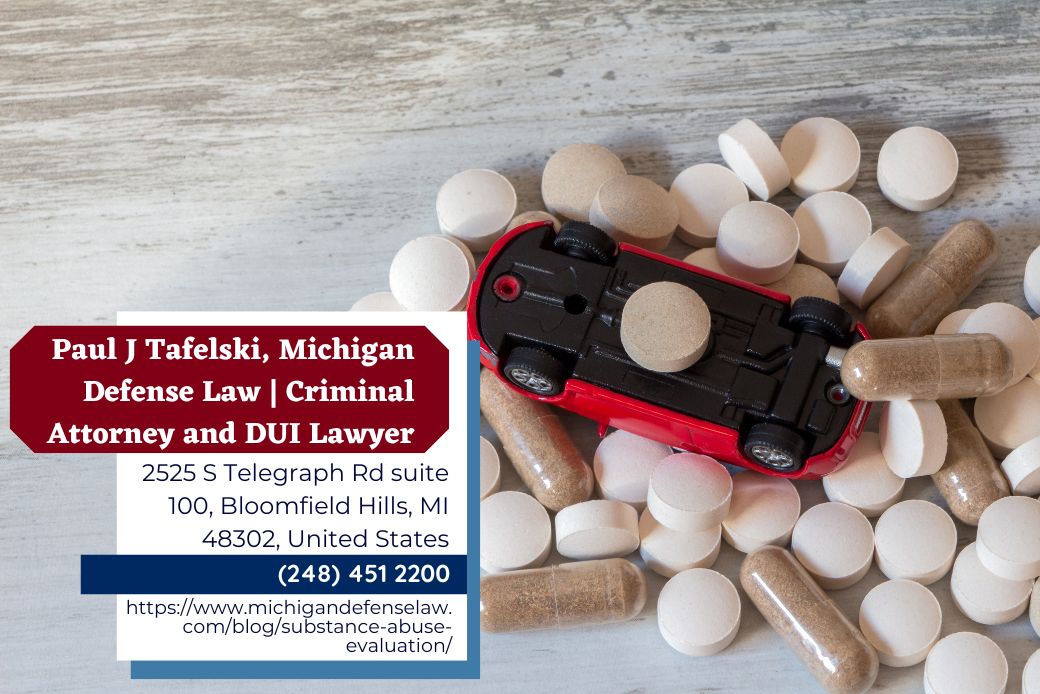Paul J. Tafelski (https://www.michigandefenselaw.com/blog/substance-abuse-evaluation/), an Oakland County license restoration attorney from Michigan Defense Law, sheds light on the critical role of substance abuse evaluations in restoring driving privileges for individuals with substance-related offenses. These evaluations are a key step in Michigan’s license restoration process, especially for those who have lost their driving privileges due to alcohol or drug-related incidents. Paul J. Tafelski emphasizes that a thorough and well-documented evaluation can significantly improve an individual’s chances of regaining their driver's license.
Substance abuse evaluations are essential for individuals seeking license restoration in Michigan, particularly for those who have been convicted of substance-related offenses. These evaluations serve as a comprehensive assessment of the individual’s substance use history, current behavior, and the potential for relapse. Paul J. Tafelski, an experienced Oakland County license restoration attorney, explains that these evaluations are not just a formality but a critical component that the state's Driver Assessment and Appeal Division (DAAD) relies on when making decisions about whether to restore someone’s driving privileges.
“Substance abuse evaluations are one of the most important pieces of evidence in a license restoration case,” says Oakland County license restoration attorney Paul J. Tafelski. “They help demonstrate that the individual has taken responsibility for their actions and is committed to maintaining sobriety. Without a favorable evaluation, the chances of restoring driving privileges are slim.”
A substance abuse evaluation must be conducted by a certified substance abuse counselor or similarly qualified professional. The evaluation includes various key factors that help determine whether an individual is fit to regain their driving privileges. Some of these factors include the individual’s history of substance use, their participation in treatment programs, and their ability to maintain sobriety. Paul J. Tafelski, a Michigan license restoration attorney, underscores the importance of these evaluations in demonstrating that an individual is no longer a risk on the road.
“Having a well-documented substance abuse evaluation that includes treatment history, support systems, and a clear diagnosis can make all the difference in the decision-making process,” Paul J. Tafelski explains. “The evaluation needs to show consistent progress and a strong likelihood of maintaining long-term sobriety.”
One of the crucial aspects of the evaluation is the assessment of the individual’s past treatment efforts and whether they have experienced any relapses. A comprehensive record of the individual’s substance-related charges and convictions is also reviewed. The evaluator will look at evidence of support group attendance, such as Alcoholics Anonymous (AA) or other recovery programs, which helps demonstrate the individual’s commitment to recovery. Michigan license restoration attorney Paul J. Tafelski emphasizes that a detailed and well-organized evaluation report provides the hearing officer with the information needed to make an informed decision.
The evaluation process begins with an initial assessment, where the individual’s substance use history is documented. This includes the use of standardized screening tools such as the Michigan Alcohol Screening Test (MAST) and the Drug Abuse Screening Test (DAST), which provide insight into the severity of the individual’s substance use and the risk of relapse. Attorney Paul J. Tafelski notes that these tools, combined with clinical interviews and physical examinations, offer a comprehensive view of the individual’s readiness to return to driving.
“The evaluation process is designed to assess not just whether someone has stopped using substances but whether they have the tools and support systems in place to avoid relapse,” says Paul J. Tafelski. “The more detailed and accurate the evaluation, the better the chances of getting a license restored.”
Once the evaluation is complete, the results are presented to the Driver Assessment and Appeal Division (DAAD). The hearing officer reviews the evaluation, along with other supporting documents such as letters of community support and evidence of rehabilitation efforts, to determine if the individual is ready to have their driving privileges restored. According to Michigan license restoration attorney Paul J. Tafelski, consistency between the evaluation and these supporting documents is crucial in demonstrating that the individual has taken the necessary steps to address their substance use problems.
For individuals who receive an unfavorable evaluation, Paul J. Tafelski advises that they work with their attorney to address the issues raised in the report. Sometimes, a second opinion or additional documentation can help improve the chances of success in a future hearing. Addressing any gaps in the evaluation, such as incomplete treatment history or insufficient evidence of sobriety, is essential for individuals seeking to regain their driving privileges.
About Michigan Defense Law:
Michigan Defense Law, led by attorney Paul J. Tafelski, can provide legal representation for individuals facing license restoration cases across Michigan. The firm can offer dedicated support and guidance to help clients navigate Michigan’s legal system and regain their driving privileges after substance-related offenses.
Embeds:
Youtube Video: https://www.youtube.com/watch?v=DvzSxD6FTQ0
GMB: https://www.google.com/maps?cid=7441820969606749572
Email and website
Email: paul@michigandefenselaw.com
Website: https://www.michigandefenselaw.com/
Media Contact
Company Name: Michigan Defense Law
Contact Person: Paul J. Tafelski
Email: Send Email
Phone: (248) 451-2200
Address:2525 S Telegraph Rd suite 100
City: Bloomfield Hills
State: Michigan 48302
Country: United States
Website: https://www.michigandefenselaw.com/
